University Essay: Online Privacy and Business Ethics
VerifiedAdded on 2023/04/21
|9
|2337
|98
Essay
AI Summary
This essay provides a comprehensive analysis of online privacy within a business context. It begins by establishing the significance of privacy in maintaining the security of information stored in digital systems, emphasizing its inclusion in ethical business practices. The essay explores the challenges and opportunities presented by digital technology, focusing on the importance of digital privacy. It details various security measures for online platforms and discusses privacy laws in Australia and Europe. The discussion covers the protection of individual information, digital privacy definitions, and the application of privacy policies. The essay also addresses issues related to digital materials, such as information security, data accessibility, and copyright concerns. It outlines ways to ensure digital privacy, including awareness campaigns, technological solutions, and software updates. The essay further examines data protection in cloud platforms, different levels of privacy needed for individuals, and the need for modifications in privacy laws, including a functional comparison between current privacy laws in the European Union and Australia. In conclusion, the essay highlights the importance of regulations, technological advancements, and individual awareness in safeguarding online data privacy.

Running head: BUSINESS IN ETHICS
BUSINESS IN ETHICS
Name of the Student:
Name of the University:
Author Note:
BUSINESS IN ETHICS
Name of the Student:
Name of the University:
Author Note:
Paraphrase This Document
Need a fresh take? Get an instant paraphrase of this document with our AI Paraphraser
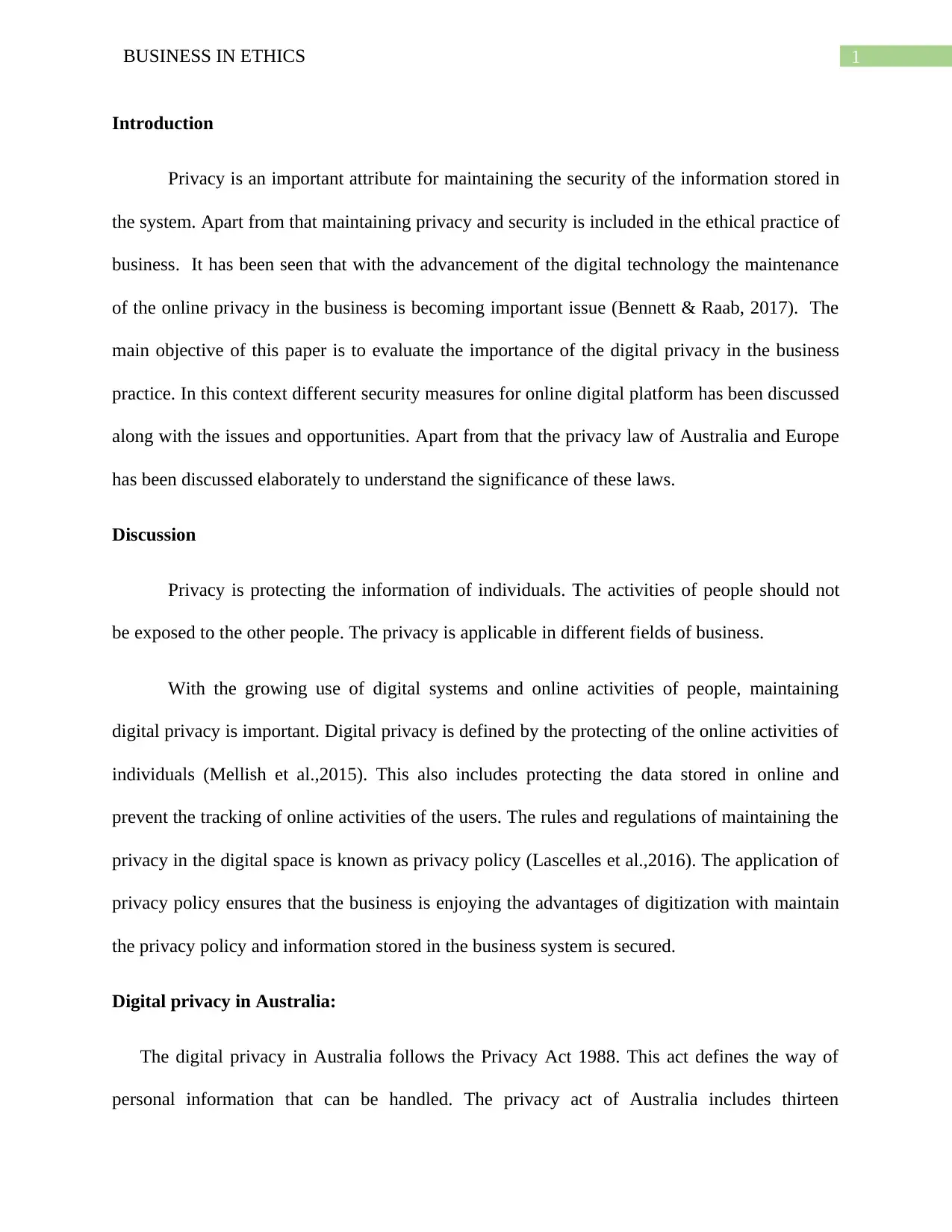
1BUSINESS IN ETHICS
Introduction
Privacy is an important attribute for maintaining the security of the information stored in
the system. Apart from that maintaining privacy and security is included in the ethical practice of
business. It has been seen that with the advancement of the digital technology the maintenance
of the online privacy in the business is becoming important issue (Bennett & Raab, 2017). The
main objective of this paper is to evaluate the importance of the digital privacy in the business
practice. In this context different security measures for online digital platform has been discussed
along with the issues and opportunities. Apart from that the privacy law of Australia and Europe
has been discussed elaborately to understand the significance of these laws.
Discussion
Privacy is protecting the information of individuals. The activities of people should not
be exposed to the other people. The privacy is applicable in different fields of business.
With the growing use of digital systems and online activities of people, maintaining
digital privacy is important. Digital privacy is defined by the protecting of the online activities of
individuals (Mellish et al.,2015). This also includes protecting the data stored in online and
prevent the tracking of online activities of the users. The rules and regulations of maintaining the
privacy in the digital space is known as privacy policy (Lascelles et al.,2016). The application of
privacy policy ensures that the business is enjoying the advantages of digitization with maintain
the privacy policy and information stored in the business system is secured.
Digital privacy in Australia:
The digital privacy in Australia follows the Privacy Act 1988. This act defines the way of
personal information that can be handled. The privacy act of Australia includes thirteen
Introduction
Privacy is an important attribute for maintaining the security of the information stored in
the system. Apart from that maintaining privacy and security is included in the ethical practice of
business. It has been seen that with the advancement of the digital technology the maintenance
of the online privacy in the business is becoming important issue (Bennett & Raab, 2017). The
main objective of this paper is to evaluate the importance of the digital privacy in the business
practice. In this context different security measures for online digital platform has been discussed
along with the issues and opportunities. Apart from that the privacy law of Australia and Europe
has been discussed elaborately to understand the significance of these laws.
Discussion
Privacy is protecting the information of individuals. The activities of people should not
be exposed to the other people. The privacy is applicable in different fields of business.
With the growing use of digital systems and online activities of people, maintaining
digital privacy is important. Digital privacy is defined by the protecting of the online activities of
individuals (Mellish et al.,2015). This also includes protecting the data stored in online and
prevent the tracking of online activities of the users. The rules and regulations of maintaining the
privacy in the digital space is known as privacy policy (Lascelles et al.,2016). The application of
privacy policy ensures that the business is enjoying the advantages of digitization with maintain
the privacy policy and information stored in the business system is secured.
Digital privacy in Australia:
The digital privacy in Australia follows the Privacy Act 1988. This act defines the way of
personal information that can be handled. The privacy act of Australia includes thirteen
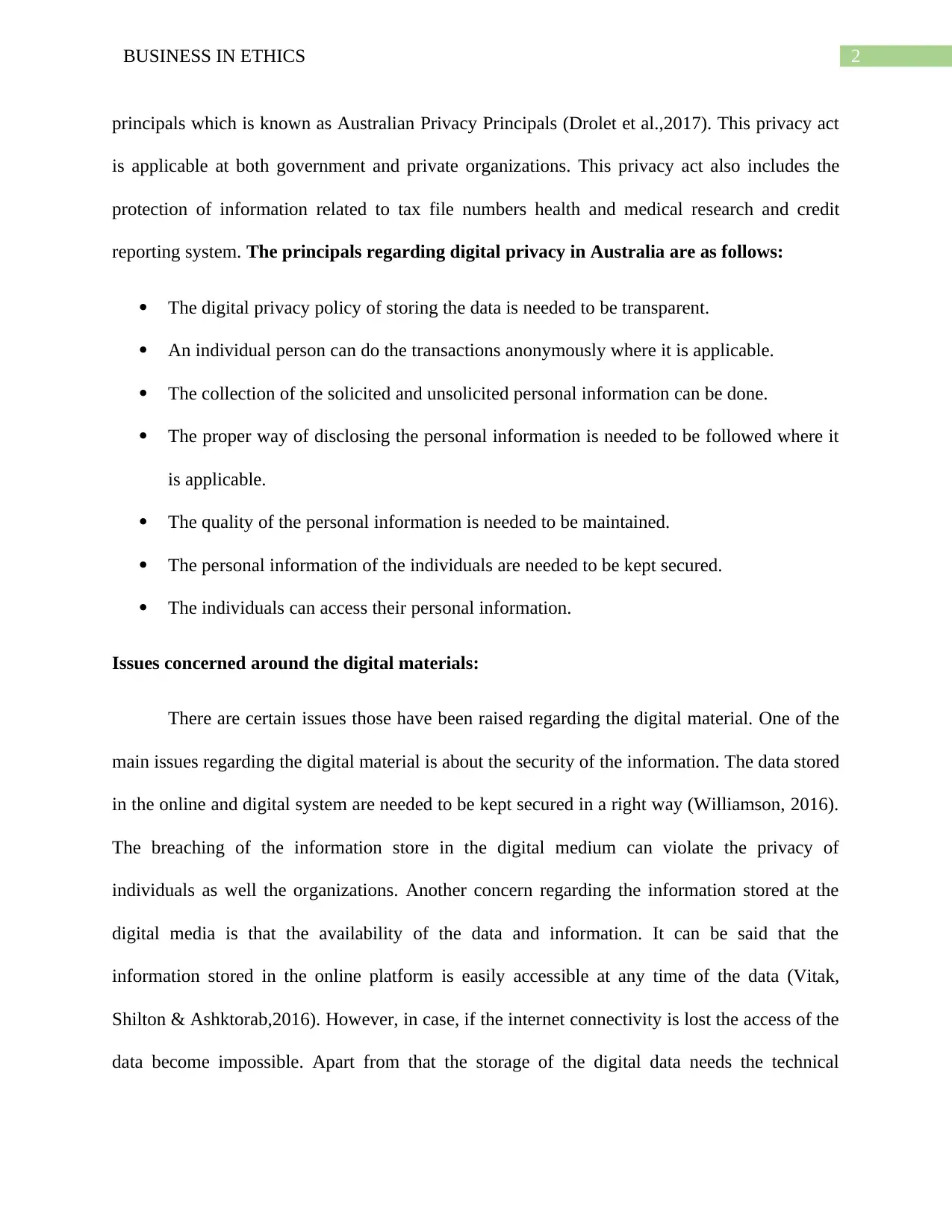
2BUSINESS IN ETHICS
principals which is known as Australian Privacy Principals (Drolet et al.,2017). This privacy act
is applicable at both government and private organizations. This privacy act also includes the
protection of information related to tax file numbers health and medical research and credit
reporting system. The principals regarding digital privacy in Australia are as follows:
The digital privacy policy of storing the data is needed to be transparent.
An individual person can do the transactions anonymously where it is applicable.
The collection of the solicited and unsolicited personal information can be done.
The proper way of disclosing the personal information is needed to be followed where it
is applicable.
The quality of the personal information is needed to be maintained.
The personal information of the individuals are needed to be kept secured.
The individuals can access their personal information.
Issues concerned around the digital materials:
There are certain issues those have been raised regarding the digital material. One of the
main issues regarding the digital material is about the security of the information. The data stored
in the online and digital system are needed to be kept secured in a right way (Williamson, 2016).
The breaching of the information store in the digital medium can violate the privacy of
individuals as well the organizations. Another concern regarding the information stored at the
digital media is that the availability of the data and information. It can be said that the
information stored in the online platform is easily accessible at any time of the data (Vitak,
Shilton & Ashktorab,2016). However, in case, if the internet connectivity is lost the access of the
data become impossible. Apart from that the storage of the digital data needs the technical
principals which is known as Australian Privacy Principals (Drolet et al.,2017). This privacy act
is applicable at both government and private organizations. This privacy act also includes the
protection of information related to tax file numbers health and medical research and credit
reporting system. The principals regarding digital privacy in Australia are as follows:
The digital privacy policy of storing the data is needed to be transparent.
An individual person can do the transactions anonymously where it is applicable.
The collection of the solicited and unsolicited personal information can be done.
The proper way of disclosing the personal information is needed to be followed where it
is applicable.
The quality of the personal information is needed to be maintained.
The personal information of the individuals are needed to be kept secured.
The individuals can access their personal information.
Issues concerned around the digital materials:
There are certain issues those have been raised regarding the digital material. One of the
main issues regarding the digital material is about the security of the information. The data stored
in the online and digital system are needed to be kept secured in a right way (Williamson, 2016).
The breaching of the information store in the digital medium can violate the privacy of
individuals as well the organizations. Another concern regarding the information stored at the
digital media is that the availability of the data and information. It can be said that the
information stored in the online platform is easily accessible at any time of the data (Vitak,
Shilton & Ashktorab,2016). However, in case, if the internet connectivity is lost the access of the
data become impossible. Apart from that the storage of the digital data needs the technical
⊘ This is a preview!⊘
Do you want full access?
Subscribe today to unlock all pages.

Trusted by 1+ million students worldwide
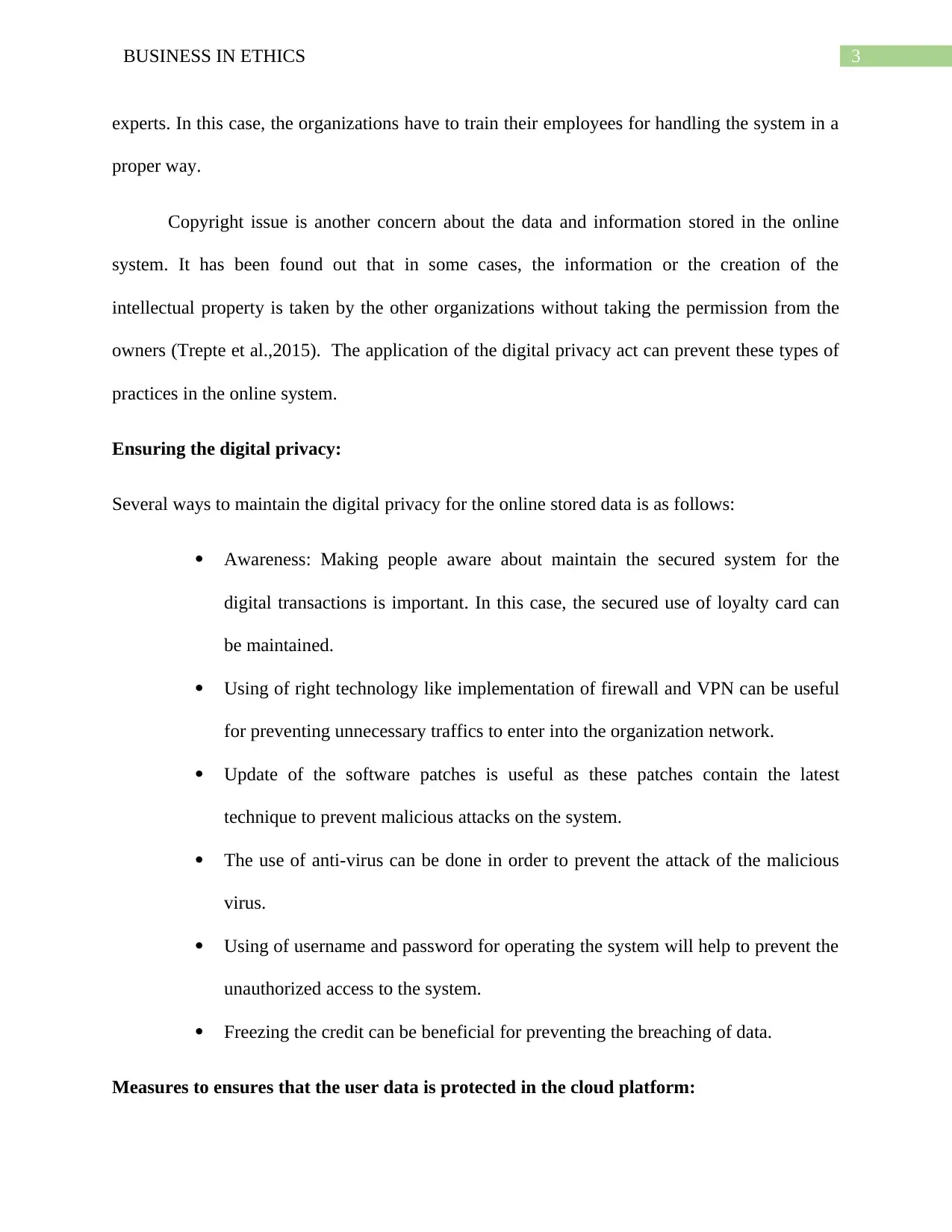
3BUSINESS IN ETHICS
experts. In this case, the organizations have to train their employees for handling the system in a
proper way.
Copyright issue is another concern about the data and information stored in the online
system. It has been found out that in some cases, the information or the creation of the
intellectual property is taken by the other organizations without taking the permission from the
owners (Trepte et al.,2015). The application of the digital privacy act can prevent these types of
practices in the online system.
Ensuring the digital privacy:
Several ways to maintain the digital privacy for the online stored data is as follows:
Awareness: Making people aware about maintain the secured system for the
digital transactions is important. In this case, the secured use of loyalty card can
be maintained.
Using of right technology like implementation of firewall and VPN can be useful
for preventing unnecessary traffics to enter into the organization network.
Update of the software patches is useful as these patches contain the latest
technique to prevent malicious attacks on the system.
The use of anti-virus can be done in order to prevent the attack of the malicious
virus.
Using of username and password for operating the system will help to prevent the
unauthorized access to the system.
Freezing the credit can be beneficial for preventing the breaching of data.
Measures to ensures that the user data is protected in the cloud platform:
experts. In this case, the organizations have to train their employees for handling the system in a
proper way.
Copyright issue is another concern about the data and information stored in the online
system. It has been found out that in some cases, the information or the creation of the
intellectual property is taken by the other organizations without taking the permission from the
owners (Trepte et al.,2015). The application of the digital privacy act can prevent these types of
practices in the online system.
Ensuring the digital privacy:
Several ways to maintain the digital privacy for the online stored data is as follows:
Awareness: Making people aware about maintain the secured system for the
digital transactions is important. In this case, the secured use of loyalty card can
be maintained.
Using of right technology like implementation of firewall and VPN can be useful
for preventing unnecessary traffics to enter into the organization network.
Update of the software patches is useful as these patches contain the latest
technique to prevent malicious attacks on the system.
The use of anti-virus can be done in order to prevent the attack of the malicious
virus.
Using of username and password for operating the system will help to prevent the
unauthorized access to the system.
Freezing the credit can be beneficial for preventing the breaching of data.
Measures to ensures that the user data is protected in the cloud platform:
Paraphrase This Document
Need a fresh take? Get an instant paraphrase of this document with our AI Paraphraser
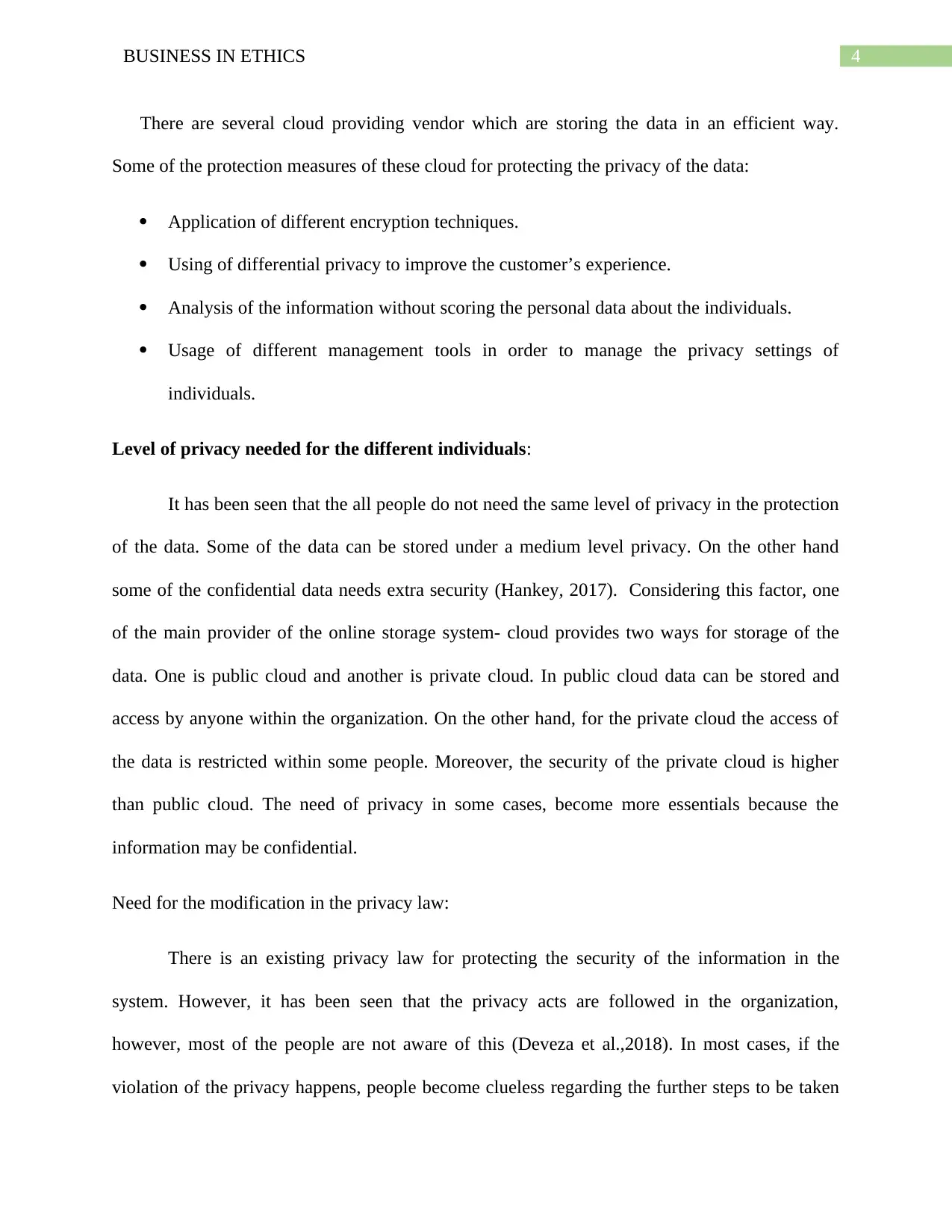
4BUSINESS IN ETHICS
There are several cloud providing vendor which are storing the data in an efficient way.
Some of the protection measures of these cloud for protecting the privacy of the data:
Application of different encryption techniques.
Using of differential privacy to improve the customer’s experience.
Analysis of the information without scoring the personal data about the individuals.
Usage of different management tools in order to manage the privacy settings of
individuals.
Level of privacy needed for the different individuals:
It has been seen that the all people do not need the same level of privacy in the protection
of the data. Some of the data can be stored under a medium level privacy. On the other hand
some of the confidential data needs extra security (Hankey, 2017). Considering this factor, one
of the main provider of the online storage system- cloud provides two ways for storage of the
data. One is public cloud and another is private cloud. In public cloud data can be stored and
access by anyone within the organization. On the other hand, for the private cloud the access of
the data is restricted within some people. Moreover, the security of the private cloud is higher
than public cloud. The need of privacy in some cases, become more essentials because the
information may be confidential.
Need for the modification in the privacy law:
There is an existing privacy law for protecting the security of the information in the
system. However, it has been seen that the privacy acts are followed in the organization,
however, most of the people are not aware of this (Deveza et al.,2018). In most cases, if the
violation of the privacy happens, people become clueless regarding the further steps to be taken
There are several cloud providing vendor which are storing the data in an efficient way.
Some of the protection measures of these cloud for protecting the privacy of the data:
Application of different encryption techniques.
Using of differential privacy to improve the customer’s experience.
Analysis of the information without scoring the personal data about the individuals.
Usage of different management tools in order to manage the privacy settings of
individuals.
Level of privacy needed for the different individuals:
It has been seen that the all people do not need the same level of privacy in the protection
of the data. Some of the data can be stored under a medium level privacy. On the other hand
some of the confidential data needs extra security (Hankey, 2017). Considering this factor, one
of the main provider of the online storage system- cloud provides two ways for storage of the
data. One is public cloud and another is private cloud. In public cloud data can be stored and
access by anyone within the organization. On the other hand, for the private cloud the access of
the data is restricted within some people. Moreover, the security of the private cloud is higher
than public cloud. The need of privacy in some cases, become more essentials because the
information may be confidential.
Need for the modification in the privacy law:
There is an existing privacy law for protecting the security of the information in the
system. However, it has been seen that the privacy acts are followed in the organization,
however, most of the people are not aware of this (Deveza et al.,2018). In most cases, if the
violation of the privacy happens, people become clueless regarding the further steps to be taken
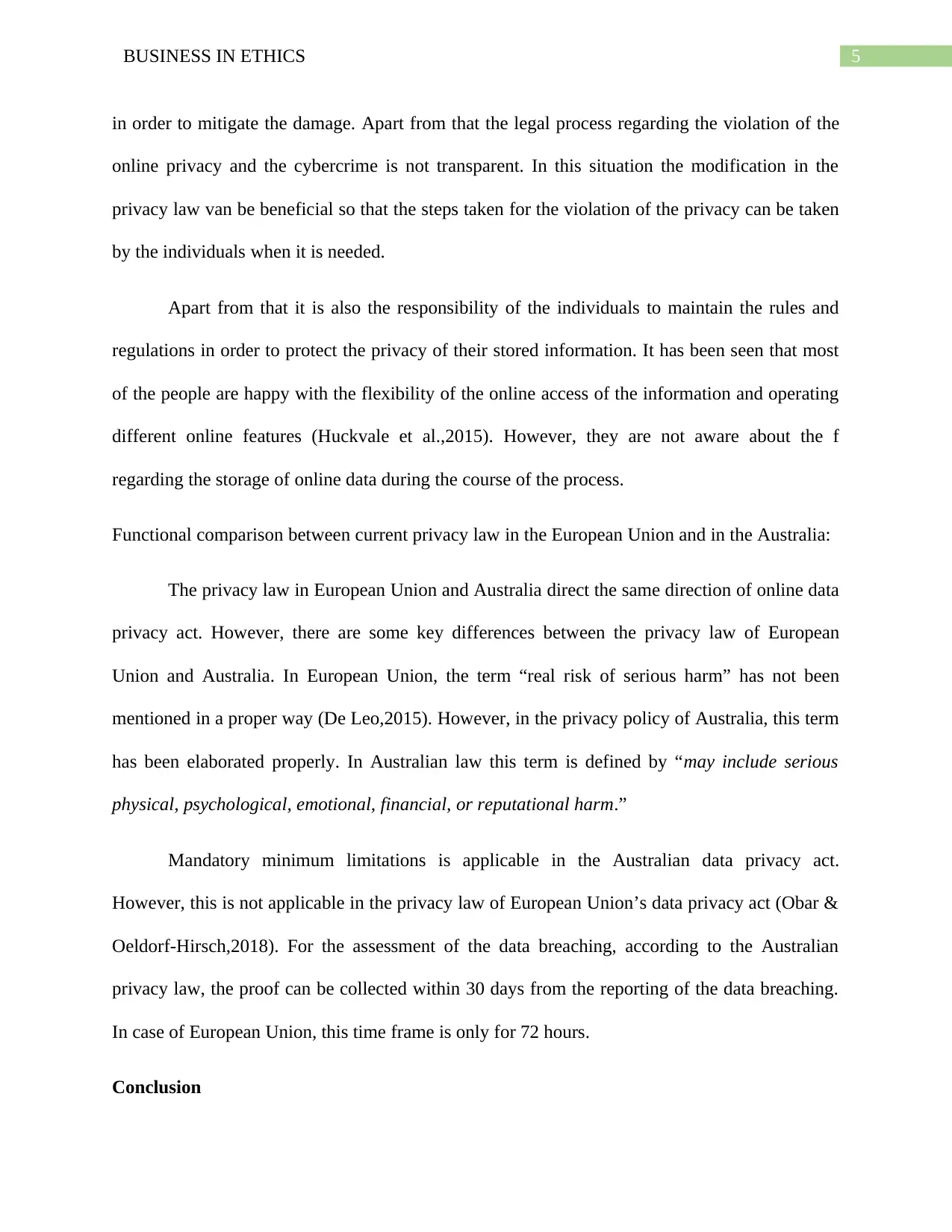
5BUSINESS IN ETHICS
in order to mitigate the damage. Apart from that the legal process regarding the violation of the
online privacy and the cybercrime is not transparent. In this situation the modification in the
privacy law van be beneficial so that the steps taken for the violation of the privacy can be taken
by the individuals when it is needed.
Apart from that it is also the responsibility of the individuals to maintain the rules and
regulations in order to protect the privacy of their stored information. It has been seen that most
of the people are happy with the flexibility of the online access of the information and operating
different online features (Huckvale et al.,2015). However, they are not aware about the f
regarding the storage of online data during the course of the process.
Functional comparison between current privacy law in the European Union and in the Australia:
The privacy law in European Union and Australia direct the same direction of online data
privacy act. However, there are some key differences between the privacy law of European
Union and Australia. In European Union, the term “real risk of serious harm” has not been
mentioned in a proper way (De Leo,2015). However, in the privacy policy of Australia, this term
has been elaborated properly. In Australian law this term is defined by “may include serious
physical, psychological, emotional, financial, or reputational harm.”
Mandatory minimum limitations is applicable in the Australian data privacy act.
However, this is not applicable in the privacy law of European Union’s data privacy act (Obar &
Oeldorf-Hirsch,2018). For the assessment of the data breaching, according to the Australian
privacy law, the proof can be collected within 30 days from the reporting of the data breaching.
In case of European Union, this time frame is only for 72 hours.
Conclusion
in order to mitigate the damage. Apart from that the legal process regarding the violation of the
online privacy and the cybercrime is not transparent. In this situation the modification in the
privacy law van be beneficial so that the steps taken for the violation of the privacy can be taken
by the individuals when it is needed.
Apart from that it is also the responsibility of the individuals to maintain the rules and
regulations in order to protect the privacy of their stored information. It has been seen that most
of the people are happy with the flexibility of the online access of the information and operating
different online features (Huckvale et al.,2015). However, they are not aware about the f
regarding the storage of online data during the course of the process.
Functional comparison between current privacy law in the European Union and in the Australia:
The privacy law in European Union and Australia direct the same direction of online data
privacy act. However, there are some key differences between the privacy law of European
Union and Australia. In European Union, the term “real risk of serious harm” has not been
mentioned in a proper way (De Leo,2015). However, in the privacy policy of Australia, this term
has been elaborated properly. In Australian law this term is defined by “may include serious
physical, psychological, emotional, financial, or reputational harm.”
Mandatory minimum limitations is applicable in the Australian data privacy act.
However, this is not applicable in the privacy law of European Union’s data privacy act (Obar &
Oeldorf-Hirsch,2018). For the assessment of the data breaching, according to the Australian
privacy law, the proof can be collected within 30 days from the reporting of the data breaching.
In case of European Union, this time frame is only for 72 hours.
Conclusion
⊘ This is a preview!⊘
Do you want full access?
Subscribe today to unlock all pages.

Trusted by 1+ million students worldwide
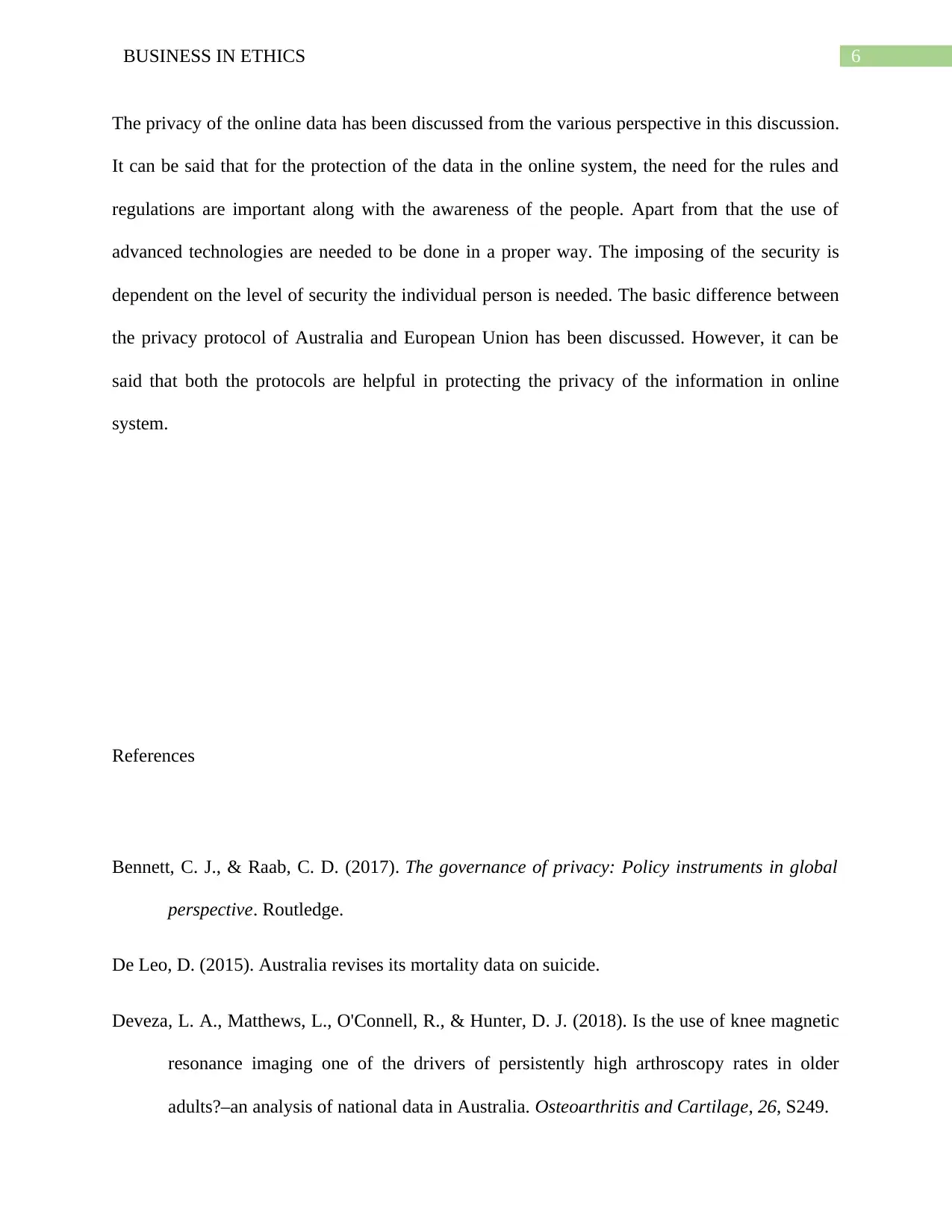
6BUSINESS IN ETHICS
The privacy of the online data has been discussed from the various perspective in this discussion.
It can be said that for the protection of the data in the online system, the need for the rules and
regulations are important along with the awareness of the people. Apart from that the use of
advanced technologies are needed to be done in a proper way. The imposing of the security is
dependent on the level of security the individual person is needed. The basic difference between
the privacy protocol of Australia and European Union has been discussed. However, it can be
said that both the protocols are helpful in protecting the privacy of the information in online
system.
References
Bennett, C. J., & Raab, C. D. (2017). The governance of privacy: Policy instruments in global
perspective. Routledge.
De Leo, D. (2015). Australia revises its mortality data on suicide.
Deveza, L. A., Matthews, L., O'Connell, R., & Hunter, D. J. (2018). Is the use of knee magnetic
resonance imaging one of the drivers of persistently high arthroscopy rates in older
adults?–an analysis of national data in Australia. Osteoarthritis and Cartilage, 26, S249.
The privacy of the online data has been discussed from the various perspective in this discussion.
It can be said that for the protection of the data in the online system, the need for the rules and
regulations are important along with the awareness of the people. Apart from that the use of
advanced technologies are needed to be done in a proper way. The imposing of the security is
dependent on the level of security the individual person is needed. The basic difference between
the privacy protocol of Australia and European Union has been discussed. However, it can be
said that both the protocols are helpful in protecting the privacy of the information in online
system.
References
Bennett, C. J., & Raab, C. D. (2017). The governance of privacy: Policy instruments in global
perspective. Routledge.
De Leo, D. (2015). Australia revises its mortality data on suicide.
Deveza, L. A., Matthews, L., O'Connell, R., & Hunter, D. J. (2018). Is the use of knee magnetic
resonance imaging one of the drivers of persistently high arthroscopy rates in older
adults?–an analysis of national data in Australia. Osteoarthritis and Cartilage, 26, S249.
Paraphrase This Document
Need a fresh take? Get an instant paraphrase of this document with our AI Paraphraser
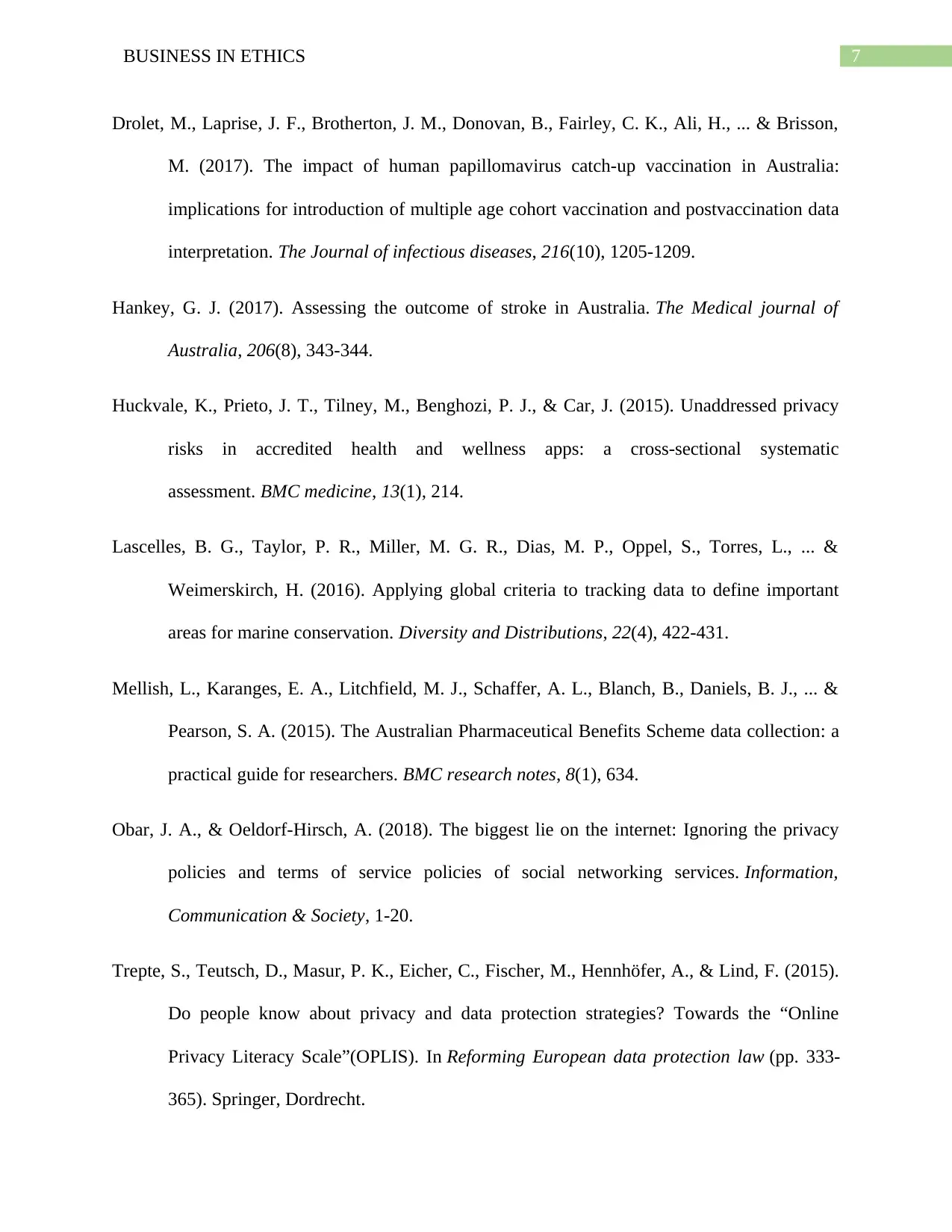
7BUSINESS IN ETHICS
Drolet, M., Laprise, J. F., Brotherton, J. M., Donovan, B., Fairley, C. K., Ali, H., ... & Brisson,
M. (2017). The impact of human papillomavirus catch-up vaccination in Australia:
implications for introduction of multiple age cohort vaccination and postvaccination data
interpretation. The Journal of infectious diseases, 216(10), 1205-1209.
Hankey, G. J. (2017). Assessing the outcome of stroke in Australia. The Medical journal of
Australia, 206(8), 343-344.
Huckvale, K., Prieto, J. T., Tilney, M., Benghozi, P. J., & Car, J. (2015). Unaddressed privacy
risks in accredited health and wellness apps: a cross-sectional systematic
assessment. BMC medicine, 13(1), 214.
Lascelles, B. G., Taylor, P. R., Miller, M. G. R., Dias, M. P., Oppel, S., Torres, L., ... &
Weimerskirch, H. (2016). Applying global criteria to tracking data to define important
areas for marine conservation. Diversity and Distributions, 22(4), 422-431.
Mellish, L., Karanges, E. A., Litchfield, M. J., Schaffer, A. L., Blanch, B., Daniels, B. J., ... &
Pearson, S. A. (2015). The Australian Pharmaceutical Benefits Scheme data collection: a
practical guide for researchers. BMC research notes, 8(1), 634.
Obar, J. A., & Oeldorf-Hirsch, A. (2018). The biggest lie on the internet: Ignoring the privacy
policies and terms of service policies of social networking services. Information,
Communication & Society, 1-20.
Trepte, S., Teutsch, D., Masur, P. K., Eicher, C., Fischer, M., Hennhöfer, A., & Lind, F. (2015).
Do people know about privacy and data protection strategies? Towards the “Online
Privacy Literacy Scale”(OPLIS). In Reforming European data protection law (pp. 333-
365). Springer, Dordrecht.
Drolet, M., Laprise, J. F., Brotherton, J. M., Donovan, B., Fairley, C. K., Ali, H., ... & Brisson,
M. (2017). The impact of human papillomavirus catch-up vaccination in Australia:
implications for introduction of multiple age cohort vaccination and postvaccination data
interpretation. The Journal of infectious diseases, 216(10), 1205-1209.
Hankey, G. J. (2017). Assessing the outcome of stroke in Australia. The Medical journal of
Australia, 206(8), 343-344.
Huckvale, K., Prieto, J. T., Tilney, M., Benghozi, P. J., & Car, J. (2015). Unaddressed privacy
risks in accredited health and wellness apps: a cross-sectional systematic
assessment. BMC medicine, 13(1), 214.
Lascelles, B. G., Taylor, P. R., Miller, M. G. R., Dias, M. P., Oppel, S., Torres, L., ... &
Weimerskirch, H. (2016). Applying global criteria to tracking data to define important
areas for marine conservation. Diversity and Distributions, 22(4), 422-431.
Mellish, L., Karanges, E. A., Litchfield, M. J., Schaffer, A. L., Blanch, B., Daniels, B. J., ... &
Pearson, S. A. (2015). The Australian Pharmaceutical Benefits Scheme data collection: a
practical guide for researchers. BMC research notes, 8(1), 634.
Obar, J. A., & Oeldorf-Hirsch, A. (2018). The biggest lie on the internet: Ignoring the privacy
policies and terms of service policies of social networking services. Information,
Communication & Society, 1-20.
Trepte, S., Teutsch, D., Masur, P. K., Eicher, C., Fischer, M., Hennhöfer, A., & Lind, F. (2015).
Do people know about privacy and data protection strategies? Towards the “Online
Privacy Literacy Scale”(OPLIS). In Reforming European data protection law (pp. 333-
365). Springer, Dordrecht.
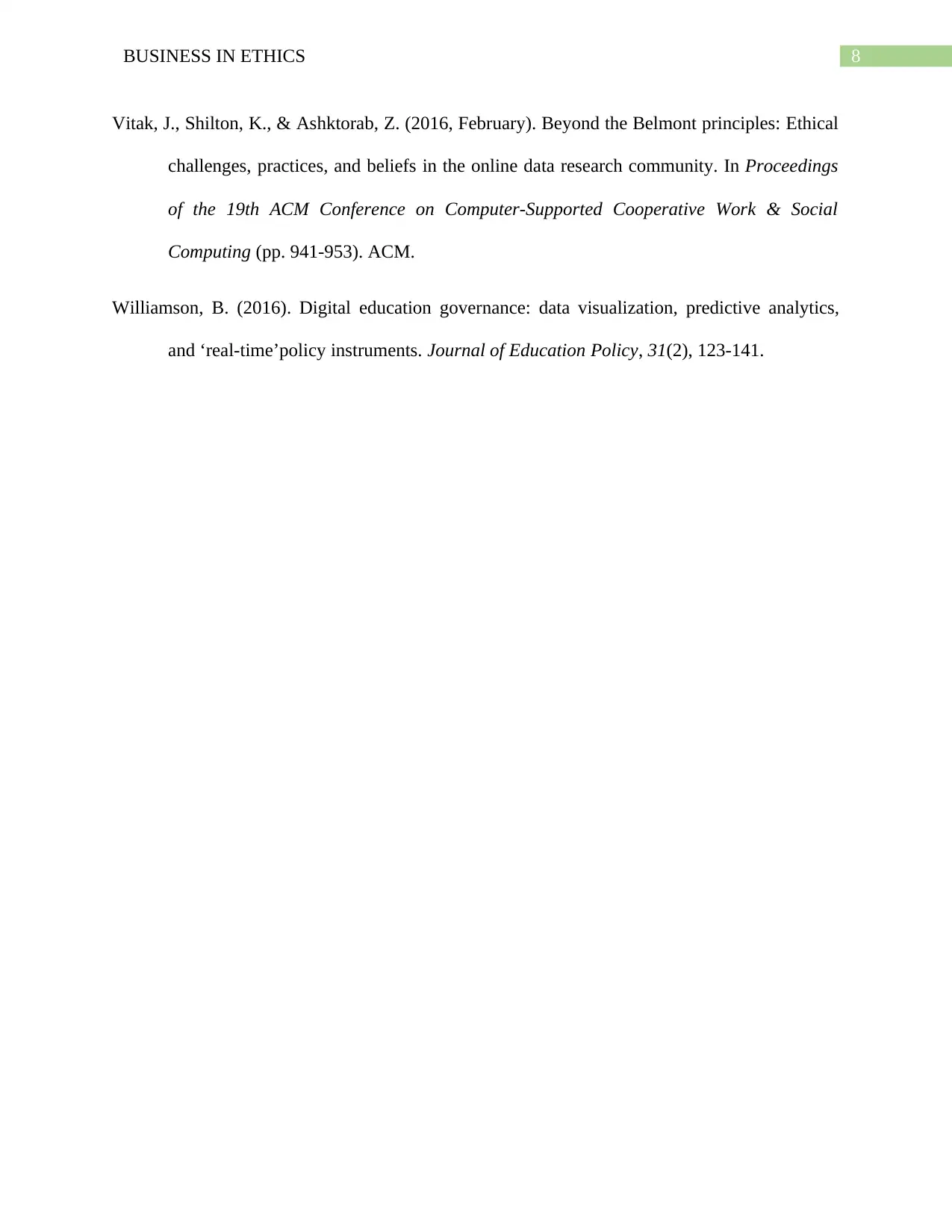
8BUSINESS IN ETHICS
Vitak, J., Shilton, K., & Ashktorab, Z. (2016, February). Beyond the Belmont principles: Ethical
challenges, practices, and beliefs in the online data research community. In Proceedings
of the 19th ACM Conference on Computer-Supported Cooperative Work & Social
Computing (pp. 941-953). ACM.
Williamson, B. (2016). Digital education governance: data visualization, predictive analytics,
and ‘real-time’policy instruments. Journal of Education Policy, 31(2), 123-141.
Vitak, J., Shilton, K., & Ashktorab, Z. (2016, February). Beyond the Belmont principles: Ethical
challenges, practices, and beliefs in the online data research community. In Proceedings
of the 19th ACM Conference on Computer-Supported Cooperative Work & Social
Computing (pp. 941-953). ACM.
Williamson, B. (2016). Digital education governance: data visualization, predictive analytics,
and ‘real-time’policy instruments. Journal of Education Policy, 31(2), 123-141.
⊘ This is a preview!⊘
Do you want full access?
Subscribe today to unlock all pages.

Trusted by 1+ million students worldwide
1 out of 9
Related Documents
Your All-in-One AI-Powered Toolkit for Academic Success.
+13062052269
info@desklib.com
Available 24*7 on WhatsApp / Email
![[object Object]](/_next/static/media/star-bottom.7253800d.svg)
Unlock your academic potential
Copyright © 2020–2026 A2Z Services. All Rights Reserved. Developed and managed by ZUCOL.

![NIT2201 - Online Privacy: An Analytical Essay - [University Name]](/_next/image/?url=https%3A%2F%2Fdesklib.com%2Fmedia%2Fimages%2Fgc%2F0656cbdd520f46bb97c676d8d876831a.jpg&w=256&q=75)


